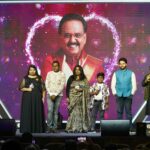Startups
Samagratha Foundation – bringing inclusivity to music
An inspiring conversation on inclusivity, dignity, and the power of music with the founders of Samagratha Foundation – Reshmi and Vinod Venugopal
1. Can you tell us about the philosophy behind Samagratha and why this mission is so important to you?
“Samagratha is not just an organisation — it’s an emotion.
We believe that talent has no boundaries, no disabilities, and no labels. Every voice deserves to be heard, and every artist deserves respect and recognition.”
The founders share that the mission was born from personal experiences and observations. They realised sympathy is not enough — systems of dignity must be created. Samagratha was envisioned as a movement where every singer is treated as a professional, paid for their art, and celebrated for their spirit.
“For us, this is not social work. It’s our way of saying thank you to music — the art form that has given us everything.”
2. Why did you choose the name “Samagratha,” and how does it reflect your vision?
“Samagratha” is a Sanskrit word meaning wholeness or inclusiveness.
The name reflects their belief in a world where everyone — regardless of challenges — feels included and valued. Music, they say, is the purest way to bring people together.
“It doesn’t see ability or disability. It only sees passion.”
3. What inspired you both to come together and create Samagratha?
Over the years, the founders encountered many extraordinary musicians — individuals with exceptional talent who were held back not by lack of ability, but by life’s circumstances. Some were differently-abled, some were struggling financially.
“But when they sang, you forgot everything else. You only heard music.”
4. For someone new, how would you describe what Samagratha does?
Samagratha proudly showcases specially-abled and marginalised musicians without tokenism — only talent.
Their events help differently-abled and underprivileged musicians earn, grow, and shine through professional performance opportunities.
5. How do you discover and welcome differently-abled artists into the Samagratha family?
Most artists join through word of mouth, social media, or chance encounters.
“When we reach out, it’s never from a place of sympathy — it’s from admiration.
We tell parents, ‘Your child is not here to be helped; they’re here because they belong.’”
This sense of belonging helps artists blossom with confidence and joy.
6. How does Samagratha support artists in getting recognition and paid opportunities?
Artists receive recognition and fair remuneration through:
-
Ticketed concerts
-
Professional stage shows
-
Collaborations with mainstream musicians
This visibility strengthens their confidence and identity as professional performers, not beneficiaries.
7. Beyond performances, how do you mentor young talents?
Many artists possess raw, beautiful talent but need guidance. Samagratha provides:
-
Voice training
-
Stage confidence coaching
-
Pronunciation help
-
Live mic training
-
Audience interaction guidance
“The goal is not to fit them into a mould — it’s to help them discover their own voice.”
8. What does a typical Samagratha performance feel like?
Audiences often arrive expecting to “support” differently-abled musicians. But within minutes:
“They’re simply mesmerized. They forget the word ‘differently-abled’ and see only brilliance.”
Every show becomes a moment of joy, pride, and transformation.
9. What sets a Samagratha performance apart from a regular concert?
Every event empowers musicians to:
-
Earn
-
Learn
-
Grow
-
Shine
“When our crew performs, it moves people. It changes perspectives.”
10. How have collaborations with established musicians shaped your journey?
Sharing the stage with seasoned musicians breaks down barriers instantly.
“The audience stops seeing ‘mainstream’ and ‘special’ artists. They just see music.”
For the differently-abled performers, these collaborations offer validation and lifelong confidence.
11. Do you feel your vision of inclusivity in music is becoming a reality?
“Yes… we can see it happening.”
Today, differently-abled artists perform on professional stages, get paid, receive media coverage, and earn the same applause as mainstream singers. The dream of inclusivity is slowly but surely coming alive.
12. How do you see the future of music evolving for differently-abled artists?
Technology and social media are removing traditional barriers. The founders envision a future where:
-
Opportunities depend on talent, not disability
-
Artists collaborate freely
-
Income is based on professionalism and skill
-
Audiences recognise pure art, not labels
“A world where music is truly for everyone.”
13. What exciting projects or events are coming up for Samagratha?
Upcoming initiatives include:
-
Ticketed concerts with established musicians
-
Expanded mentorship and training programs
-
Special initiatives to support struggling musicians with education and medical needs
The goal is to make impact beyond just performances.
14. Can you share a memorable behind-the-scenes moment?
A powerful moment occurred when a young special-needs singer realised she was the only performer not paired with a celebrity at an event. She quietly accepted it.
But when she began singing, the celebrity was so moved that he walked on stage mid-performance and said:
“I will sing this song with her.”
This moment deeply moved the founders.
“It showed us the purity, faith, and manifestation power of these children. The universe responded to her unspoken wish.”
15. What has been the biggest challenge in building Samagratha?
Changing mindsets.
In the beginning, people questioned whether differently-abled artists should perform professionally or be paid. There was hesitation and doubt.
Today, that skepticism has turned into admiration — but changing mindsets remains a gradual journey.
16. What has been your proudest moment?
Their proudest moments occur after every show, when parents — who have faced countless struggles — watch their children receive applause and heartfelt compliments.
“To see those proud, tear-filled eyes… that’s priceless.”
17. Outside Samagratha, what kind of music do you both enjoy personally?
Both founders love retro Tamil and Hindi classics from before the 2000s.
-
Reshmi admires Asha Bhosle, Lata Mangeshkar, and S. Janaki
-
Vinod is a devoted fan of Kishore Kumar, Yesudas, and SPB
“These golden-era melodies shaped our love for music.”
18. If you could collaborate with any artist in the world, who would it be and why?
They would choose the legends who shaped Indian music:
-
Lata Mangeshkar
-
Asha Bhosle
-
S. Janaki
-
P. Susheela
-
Yesudas
-
SPB
-
Kishore Kumar
“Collaborating with them — or reimagining their timeless songs inclusively — would be a dream come true.”
They’d also love to work with any artist who believes music unites and uplifts.
19. How have audiences reacted to your inclusive performances?
The reactions have been overwhelming.
Many come expecting to support an initiative, but end up deeply moved — often in tears.
“There’s always a moment when the audience forgets labels entirely. They just see artists pouring their hearts out.”
People often say:
“You’ve changed the way we look at ability.”
20. What message would you like to share with young musicians — especially those who feel sidelined?
“To every young musician and every parent — please don’t stop believing in your child’s music.”
Challenges can feel overwhelming, but they do not define talent or worth.
“Every note you sing has the power to heal, empower, and touch someone’s heart. The world may take time to notice, but when it does, it will be because of your music, your spirit, and your perseverance.”
“You are not defined by your limitations — but by the limitless joy you bring through your art.”









Archana Patil
November 21, 2025 at 9:03 pm
Best wishes to the whole team and Thank you to Vinod sir and Resmi Ma’am for giving this lovely platform for our children
Vinod Venugopal
November 26, 2025 at 12:23 pm
Thank you 🙏🏼
Ashwini Patil
November 21, 2025 at 9:14 pm
Hats off to your Nobel cause. Best wishes to each one of you. 🙏🙏